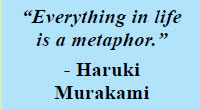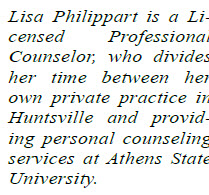 By: Lisa Philippart
By: Lisa Philippart
In my last article we discussed the concept of a therapy metaphor. Therapy metaphors use a story or illustration to see alternative ways of looking at something. Often, just seeing something differently can help us to be more objective and hopefully make wiser decisions or act more effectively. Many of these metaphors are from the book, ACT Made Simple by Dr. Russ Harris. Here are some more helpful metaphors for your emotional and mental health:
In the Playground Bully, imagine your mind as a school playground that is surrounded by a secure high fence. The fence is designed to keep children in and others out. Any bullies in the playground mean that other children can’t escape for long. One bully uses verbal abuse…shouting, teasing, and threatening. Since all the children are fenced in together, they all have to learn to accept and be with each other. Likewise, we cannot escape our thoughts. We can’t stop them, but maybe we can learn to live with them by seeing them differently. Along comes the bully, who takes on three potential victims, all who react differently. Victim 1 chooses to believe the bully, reacts automatically and becomes distressed (bully carries on.) Victim 2 challenges the bully by saying, “I’m not stupid. I got 9/10 on my spelling test this morning and you got 4/10 (bully eventually gives up.) Victim 3 looks at the bully (acknowledges the thought), walks away and goes off to play kickball with his friends (dismissing the thought, then changing the focus of attention.)
 Metaphors for the Mind—A Master Storyteller. The world’s greatest storytellers just want us to listen, saying whatever they want to say to get our attention. Some stories are true (facts.) Others are opinions, beliefs, ideas, attitudes, assumptions, and judgments. Our brains tell us stories about how we see the world, what we want to do, what we think is right or wrong, fair or unfair, good or bad. Here are some of the stories your mind is telling you:
Metaphors for the Mind—A Master Storyteller. The world’s greatest storytellers just want us to listen, saying whatever they want to say to get our attention. Some stories are true (facts.) Others are opinions, beliefs, ideas, attitudes, assumptions, and judgments. Our brains tell us stories about how we see the world, what we want to do, what we think is right or wrong, fair or unfair, good or bad. Here are some of the stories your mind is telling you:
Radio doom and gloom—Broadcasting a lot of gloom about the past, doom about the future, and dissatisfaction about the present.
The spoiled kid—Making all sorts of demands and throwing tantrums if it doesn’t get its way.
The reason-giving machine—Churning out a never-ending list of reasons why you can’t and shouldn’t change.
The dictator—Constantly ordering you about and telling you what you can and can’t do.
The judgment factory—Spending all day long making judgements.
 Google Earth and The Helicopter View. Sometimes it’s useful to see the bigger picture. When something is distressing us, we are so close to it, involved with it, part of it…it’s really hard to stand back from what’s happening. It’s a bit like Google Earth. We see the close-up view, but everything else is hidden from us. We can zoom out of perspective and see the bigger picture. Some might describe it like having a helicopter view. As the helicopter takes off, getting higher and higher, it sees a bigger picture, and is less involved with the detail at ground level.
Google Earth and The Helicopter View. Sometimes it’s useful to see the bigger picture. When something is distressing us, we are so close to it, involved with it, part of it…it’s really hard to stand back from what’s happening. It’s a bit like Google Earth. We see the close-up view, but everything else is hidden from us. We can zoom out of perspective and see the bigger picture. Some might describe it like having a helicopter view. As the helicopter takes off, getting higher and higher, it sees a bigger picture, and is less involved with the detail at ground level.
The Plane Crash. In 2009, a plane landed seemingly miraculously on the Hudson River. All 155 people came out alive. What did those 155 people feel as they stood on dry land and realized what they had been through? Did they all have the same reaction? Absolutely not. Many felt distressed and upset…they nearly died. These folks might decide never to fly again, since it is clearly too dangerous. Others felt overwhelming relief and happiness at having survived. Some decided to live life to the fullest as a result of their experience. There could be 155 different reactions. Same event, different responses. It’s not the event that causes our emotions, it’s the meaning we give the experience.
By: Lisa Philippart
Licensed Professional Counselor







